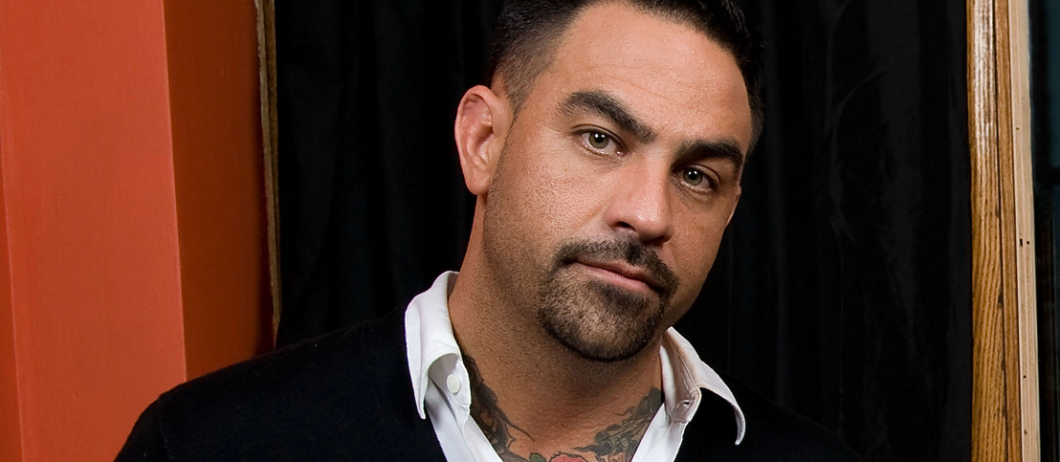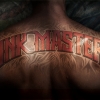Chris Nuñez has over twenty years of experience tattooing clients across the globe. Fans will remember him from his days opposite Ami James on “Miami Ink” where the tattoos accompanied the shop drama. This week, Nuñez takes a step back from working with his tattoo gun and premiers as a judge in his newest TV venture on SpikeTV’s “Ink Master.” This show pits industry authorities head-to-head in elimination competitions each week. He took the time to talk with us about his latest project and his knowledge of tattoo culture that compels him to judge the strengths and flaws of his peers.
“ I think “Ink Master” is going be the realest take that the tattoo community has seen on TV in the sense that tattooing is very much in real time —Chris Nuñez ”
Hi, Chris. Thanks so much for taking the time to speak with me this afternoon.
I’m thinking you must be pretty excited for the premiere of “Ink Master.” Some people might remember you as being the other half of “Miami Ink” where you worked as both manager and artist. I’m interested in what it means to you going from being an artist to a critic.
I think it’s basically like any art studio kind of thing. You work at one thing for so many years that whether you claim to be the best at it, or not, you know what is good or not. And you know, I have twenty-years in the business. I’ve worked all around the world. I’ve definitely put in my stripes to get where I am, and I can definitely call a good tattoo.Right on. So then, how is being a judge different than producing content?
Oh, it’s different. It’s kind of cool. It’s refreshing. And I’m not out there to hurt anybody. I think that at the end of the day, the cool thing is whether the guys like what I have to say or not, they all go back and talk about it amongst themselves and they can understand where I’m coming from. It’s not like I’m coming with anything out of left-field, and since they are all competing against each other I think they start to say, “Maybe what he’s saying is right, and we can see his point.” So I think it’s okay. I’m not really trying to do anything in any way to really tear anybody apart.You’re not the Simon Cowell of “Ink Master” then, huh?
I try not to make it that way. But again, these guys are all my peers and at the end of the day we could all be right back on the same boat together, so for the people that deserve to be there, I definitely let them know it. Those that don’t deserve to be there cannot be there, so we try to weed them out.There’s that “be good or be gone” mantra you hear in tattoo shops. What got you into tattooing?
Basically the ability to be free. I grew up with a family that I travelled with a lot and spent a lot of my childhood growing up on planes. And it just felt like if I knew how to tattoo, I could go anywhere around the country and more so anywhere on the planet. I’d be able to earn a living, take in other cultures, and work with people that I really looked up to. That was really the turning point and basis for my tattooing was that I really loved the art. I’ve looked at it since I was a little kid and I knew that I always wanted to be part of that. Even when I was eight, ten years old, I’d see guys walking around with tattoos and I thought it was the coolest thing. By the time I was twelve I was doing graffiti, buying tattoo magazines and copying the images out of the pages, trying to copy a biker tattoo and putting the images up on the wall. You know, using that reference. And it kind of grew from there. But really the ability to travel and earn a living anywhere you go is what really appealed to me because I really never wanted a boss.Were there any particular cultures that you were drawn to?
Oh, for sure-Japanese tattooing. The style was something I gravitated to because it was very graphic and very bold. At the same time I spent a lot of time in Europe and the European style had a twist on Japanese tattooing; it made it a little fancier, a little more technical, or just exaggerated certain elements of the drawing or the composition itself. That really struck a chord with me so I guess I gravitated more toward a Euro-style Japanese tattoo than a traditional Japanese style. Then I got to work in Brazil with a guy who was one of the tops in the field that excelled at that, by the name of Mauricio Theodoro. We opened a tattoo shop together and that was what really kicked me into the art style that I took off with.To piggyback onto your answer, “Ink Master” features a lot of techniques on the show. What do you consider yours?
When I tattoo, I try to be as clean and solid as possible. I try to be really technical more than anything. I really look up to guys like Juan Puente. You know, the style of tattooing that Juan does is so classical and clean, and timeless; everything’s flawless. That’s what I try to look for. In this competition, I think that right now we’re trying to get a level of tattooer that, if they’re going to win this competition, they’ve got to be well-rounded and be able to do everything. When I judge category by category, I kind of took into account what they did the past week or past three weeks versus what they did this time. I think “is it worth having this person along the ride for the rest of the way as the categories get tougher?” So I really critique them harshly on technique more than on composition. I let Oliver be the composition guy.Tell us about “Ink Master” and your relationship with the rest of the cast.
Oliver and I go back. We used to tattoo together in Dallas. He had Elm Street [Tattoo Shop] and I used to tattoo around the block. We used to hang out all the time. I spent about a year and a half or two years living out in Dallas with my friend Frank Lee. Oliver and I go back at least ten, twelve years. I never knew Dave [Navarro] until the day we sat down to do pre-production for the show and he ended up being a really cool guy. He’s a really quick witted, fast-talking guy and it makes it really fun to be with someone who can have a verbal-volleyball kind of way with people that people still love him. He’s just quick. When you watch the show, you’re going to see more of him than maybe people know. And he knows a lot about art. He’s been tattooed by a lot of the greats-like greats we looked up to as kids. So, you know, he’s not the wrong man for the job. He was surprisingly on-it. Every show that went by, he opened up his art side a little more and a little more and it was like, “Damn!”Do you think “Ink Master” will make tattoos appealing to a wider audience? Do you want that?
I think “Ink Master” is going be the realest take that the tattoo community has seen on TV in the sense that tattooing is very much in real time. Contestants have four to six hours to start and complete their tattoo. They have the night before to draw it. They do a real consultation in real time with their client. When the clock starts, it starts and when it ends, it ends.; that’s what they get critiqued on.So do you want every Tom, Dick & Harry to have a great tattoo or do they mean something to a special community?
You know what? To me, the whole mainstreaming of tattooing is a kind of double-edged sword. I always loved the mystique of tattooing being the underground art style and that kind of mysterious thing. Tattoo shops weren’t therapy sessions; they were tattoo shops. You would go in, get your tattoo and leave. Most of the time you just joked around and away you went. It wasn’t so much about sharing every meaning and every decision you make when it comes to your tattoo. But have tattoo shops flourished? A hundred percent. Have tattoo artists made way better livings, and found themselves doing way more collaborations with mainstream brands and low brow art? A hundred percent. So, you know, I feel torn both ways but I feel like I also had a huge impact in progressing our art form to the world.If you could prohibit one kind of tattoos from ever being done again, on “Ink Master” or in the world, do you have anything in mind?
It’s not for me to say what the world should or shouldn’t put on their body. No one could’ve told me what to put onto my body. At the end of the day, work for the client. If we personally don’t feel like what the client wants is our forte then it’s our responsibility to send the client to someone who might enjoy that better. But styles make fights, and it’s just like that. There’s always going to be somebody for someone. I’m pretty open. I don’t think it’s right to tell somebody what’s good or bad because you really can’t. You’ve just got to try to steer them in the right direction and let them decide from there. If it’s something you, as an artist, can’t stand, then politely tell them it’s not your bag.Well said. I really appreciate your time, Chris, and for being so open with me. Best of luck with “Ink Master.” We’ll all be watching.!
No sweat! Thank you very much.
We will be publishing a series of interviews with the other cast members from “Ink Master,” including Oliver Peck and Dave Navarro (who we feature in this upcoming issue of VAR Magazine.”)
Check out Chris Nunez’s work on the Love Hate Shop website and then head on over to the Ink Masters page to see what’s coming up.





2 Responses to Ink Master Chris Nunez